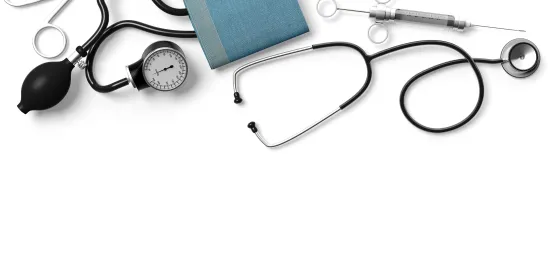Having been in the company of literally thousands of physicians, dentists, psychologists, nurses, and just about every other kind of health professional as they undergo investigations, reviews, and prosecutions of their licenses, privileges, credentials, and registrations, we have observed several things that we hope the reader will find useful.
The process is always extremely stressful, and the outcome depends a great deal on what the practitioner has done and is willing to do to improve. There are some simple things, though, that can be done, well in advance of any trouble, to help make these problems easier to weather.
Have a Provider Other Than Yourself
“Physician, heal thyself,” if ever intended to be taken literally, certainly should not be today. Somewhat like the tale of the cobbler’s children having no shoes, we see many providers who themselves have no regular provider. Some might think they do not need one or do not have the time. Some do not want one of their colleagues, particularly someone from the same community, to know of their health issues. These are valid concerns, but having access to good care is very important for health and to avoid violating the law in caring for oneself.
We have known several practitioners whose legal problems stem entirely from their own medical problems being poorly managed. Sometimes, this includes untreated or under-treated pain that becomes disabling. Self-prescribing is a predictable result. Self-prescribing is never a good idea and always, when detected, arouses the suspicions of regulators. Substance use disorder often follows. Never write yourself or those close to you a prescription for controlled substances, especially not using someone else's name as a patient or prescriber.
Once these practitioners delegate their care to a colleague, their legal problems become relatively simple to resolve. Sadly, though, many practitioners have gone through months of unnecessary suffering and had legal problems that leave indelible marks on their lives and careers, all from not having a doctor.
Buy Good Insurance
The second thing we have noticed is that, generally speaking, those with good insurance have an easier time and do better through these troubles than those without any. Most of us hate buying insurance; it costs money but brings no revenue. There is a great deal to know about insurance before you buy it, and we do not mean for this article to be a comprehensive statement on the subject; however, please consider the following:
Health Insurance
Corresponding to the need for practitioners to have their own doctor comes the need to have the means to pay for it. Practitioners need such services, including mental health and substance use disorder services, at about the same rate as the population as a whole, and these services, if needed, can be quite expensive. Being able to get good help for whatever ails you can make all the difference in saving your career.
Similarly, get health insurance for your family and employees too, and make them use it. Do not treat them yourself. The erosion of boundaries in treating your family and staff can be a problem. Can you be objective? How will you and those close to you feel in the event of an adverse outcome? Will regulators become suspicious that the prescription you are writing is really to obtain drugs for your own use? Are you keeping proper records of your treatment of friends and family?
Malpractice Insurance
Some malpractice insurance covers the costs of defense of licensing, privileging, and credentialing problems. Some companies expressly cover disciplinary proceedings, tax audits, billing disputes by payors, and other regulatory proceedings, sometimes whether or not such proceedings are related to a traditional malpractice claim. Even companies that do not explicitly cover such matters will sometimes pay a lawyer to represent you in these if the company believes success in the matter lessens their liability exposure. A few companies will pay a lawyer for such matters, even if not otherwise covered, just to maintain good relations with their insured.
Usually, there are limits for this coverage, often approximately $50,000.00. Sometimes deductibles and co-payments apply. Occasionally, an insurer will pay beyond these limits if the company believes it is in its interest.
Disability Insurance
A significant fraction of problems practitioners have with their licenses, privileges, and credentials arise when the practitioner has a medical problem that interferes with practice. Better disability insurance policies pay benefits under such circumstances. It is getting harder to find and quite expensive, but look for “own occupation” coverage, meaning basically that you will receive benefits if you are disabled from practicing in your specialty, even if you are capable of other work. Some policies also have a rehabilitation benefit that will pay for care to get you back into practice, sometimes beyond what health insurance would pay for. Also available, separately, is disability insurance that will pay office expenses. This is particularly important for solo and small practices and can make the difference between having a practice to return to and having to start over.
A Few Other Simple Things
Here are some things to avoid. Do not:
- Lie to the licensing board, even about something insignificant, like omitting you were on academic probation in school because it took you two tries to pass a particular test.
- Begin performing a procedure only marginally related to the specialty in which you trained after having taken a weekend course on the procedure.
- Let others fill out prescriptions (or call them in) without checking with you or pre-sign a few prescription blanks (or, the modern variant, give to a staff member one or both of your “two-factor” authenticators to the e-prescribing system).
- Agree to supervise an advanced practice provider you have never met before, and then continue that degree of acquaintance.
- Except for a few professions (pharmacy and nursing among them), accept a job with a business enterprise that involves the practice of a health profession on the public or split profits on a percentage basis (in a few states, this is legal, but most health professions in North Carolina take a dim view of it).
- Fail to document appropriately.
- Fail to communicate or communicate only nastily with other members of the healthcare team.
- Operate on patients the radiologists say are normal or without documenting what anatomic defects you are correcting and why the defect is pathological.
- Practice in a way most of your colleagues would call “experimental” without being in an academic institution or without formal involvement in a clinical trial.
- Drink alcohol (or use any analogous substances) while on call or within a few hours before duty.
Conclusion
Navigating the complexities of professional licensing can be overwhelming for healthcare practitioners. By prioritizing consistent medical care, investing in comprehensive insurance, and adhering to ethical practices, you can significantly reduce your risk of facing legal issues.





 />i
/>i

